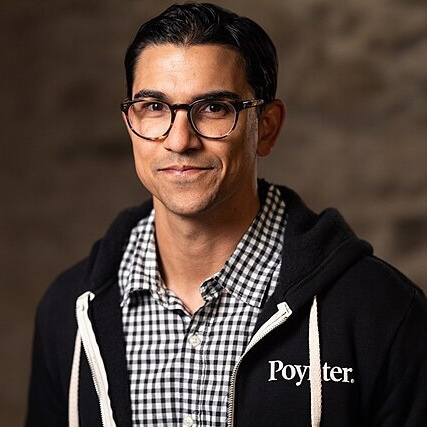As newsrooms rush to adopt generative artificial intelligence policies and experiment with new products, the audience has been notably absent from the conversation.
That’s why Poynter has partnered with the University of Minnesota to assess how news consumers actually feel about the new technology. Focus groups held this week will inform the Poynter Summit on AI, Ethics & Journalism, which will bring together journalists, editors and technologists to bolster Poynter’s AI ethics framework and brainstorm new products.
“News organizations are understandably wary of falling behind and being slow to embrace innovation,” said Ben Toff, associate professor and director of the Minnesota Journalism Center, who is leading the research. “But with public trust in the media as polarized and fragile as it already is, it is essential to take time to understand how audiences are thinking about these rapidly changing technologies and what level of disclosure and transparency they may or may not expect to see journalists employ as they increasingly use these tools.
“By giving cross-sections of regular people space to reflect on and discuss these matters in detail, we hope our research can illuminate the contours of the public’s rapidly changing and complex attitudes on this subject in ways that surveys are not particularly well-suited to capture,” Toff said.
News leaders from The Washington Post, The Associated Press, Gannett, McClatchy and Hearst, along with many smaller organizations like the Pulitzer Prize-winning Invisible Institute, the Bradenton Herald, Vermont Public, Houston Landing and others get first access to the focus group data at the invitation-only summit. Following ethics programming featuring Poynter faculty, Hacks/Hackers will facilitate a hackathon to help participating newsrooms imagine AI products centered on audience trust and ethics.
Nikita Roy, International Center for Journalists Knight fellow and program lead of the AI Journalism Lab at the Craig Newmark School of Journalism at CUNY, and Phoebe Connelly, Washington Post senior editor for AI strategy and innovation, will kick off the programming with an overview of the AI/news landscape. And OpenAI writing community lead Jay Dixit will participate in a fireside chat during the summit. Toff, Trusting News director Joy Mayer and Joe Amditis, assistant director of products and events at the Center for Cooperative Media, will contribute to discussions on ethics, trust and newsroom AI best practices.
Earlier this year, Poynter created a template to help smaller newsrooms develop their own AI ethics policies. We’ll update that template with what we learn during the summit, and release a research brief summarizing conversations and products this summer for any size newsroom looking to experiment with generative AI.
“We are running into a fair amount of fear and reticence as we try to encourage journalists in mid-size markets to experiment with AI, and that’s a problem because the needs of newsrooms and news consumers in local markets are going to be very different from large newsrooms,” said Kelly McBride, Poynter’s senior vice president, who also chairs the Craig Newmark Center for Ethics and Leadership and serves as NPR public editor. “We are hosting this gathering to make sure that local journalists are part of the process as we figure out how to incorporate AI into our work.”







